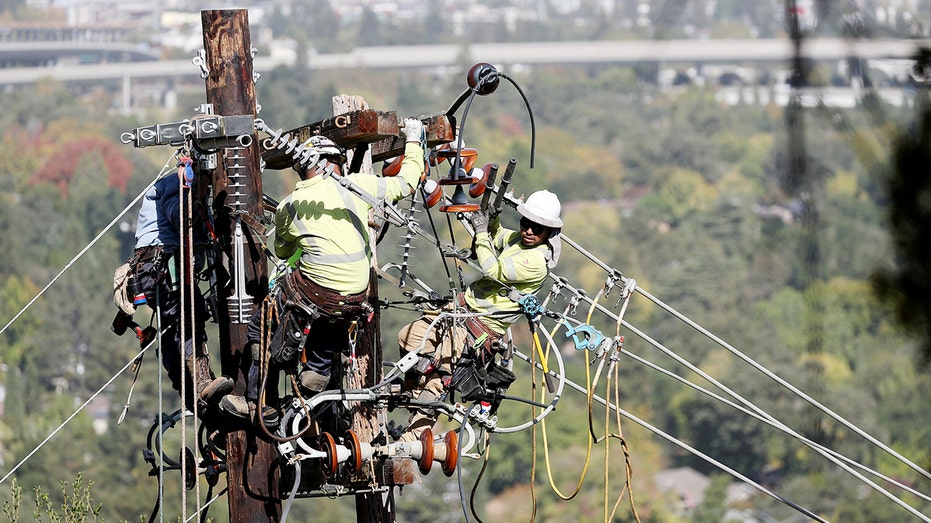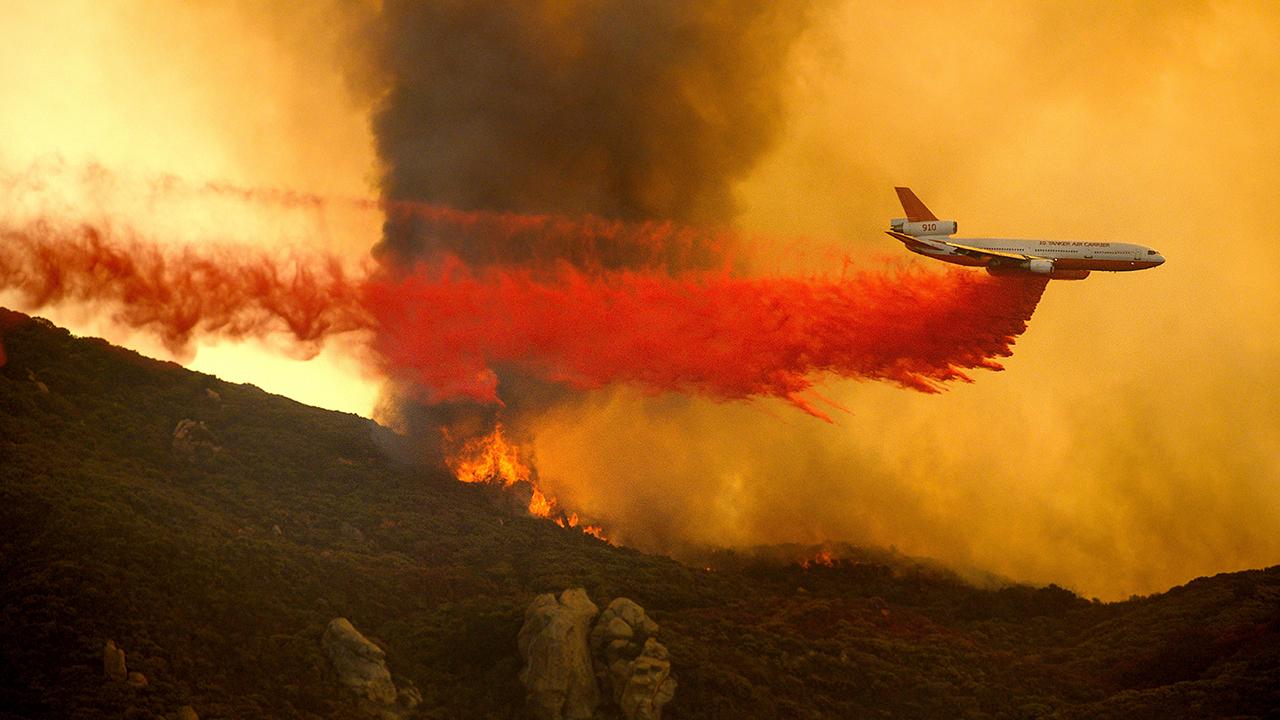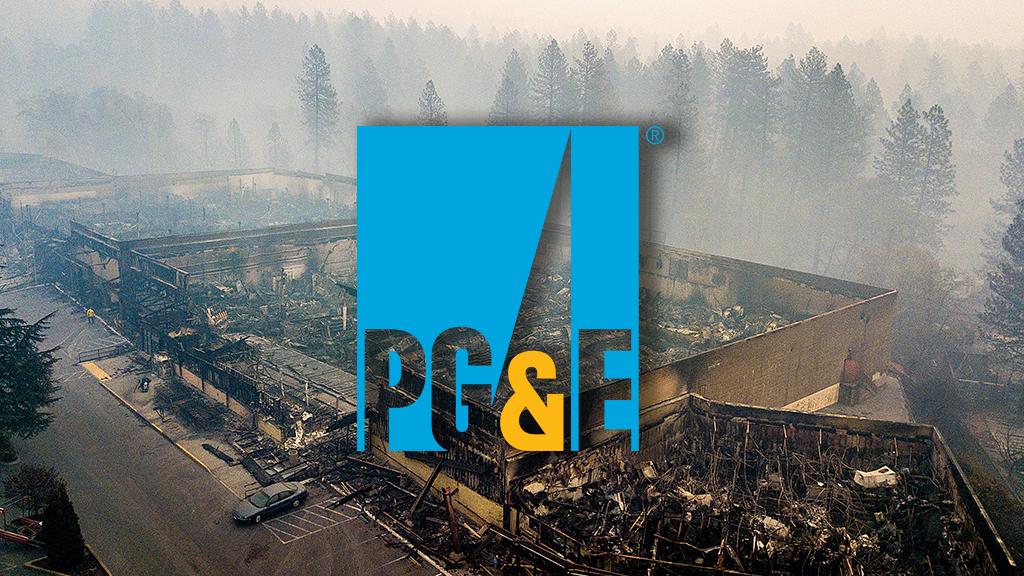PG&E had systemic problems with power line maintenance, California probe finds
PG&E Corp. failed to adequately inspect and maintain its transmission lines for years before a faulty line started the deadliest fire in California history, a state investigation has found.
In a 700-page report detailing the problems that led the Caribou-Palermo transmission line to malfunction on Nov. 8, 2018, sparking the Camp Fire, investigators with the California Public Utilities Commission said they found systemic problems with how the company oversaw safety of its oldest lines.
GET FOX BUSINESS ON THE GO BY CLICKING HERE
State fire investigators had previously determined that PG&E equipment started the Camp Fire, which killed 85 people, and the company hasn't disputed the findings. But the new report goes well beyond earlier findings, alleging numerous serious violations of state rules for maintaining electric lines and specific problems with upkeep of the transmission line that started the fire.
The investigation's conclusions corroborate many of the findings of previous Wall Street Journal articles, which found that PG&E deferred maintenance work on the Caribou-Palermo transmission line, along with numerous other older transmission lines.
Stocks In This Article:
"The identified shortcomings in PG&E's inspection and maintenance of the incident tower were not isolated, but rather indicative of an overall pattern of inadequate inspection and maintenance of PG&E's transmission facilities," the report by the commission's safety and enforcement division found.
Investigators also found that PG&E crews hadn't climbed the tower that malfunctioned and sparked the Camp Fire since at least 2001, a violation of company policy requiring such inspections on towers that have recurring problems.
CAMP FIRE IN CALIFORNIA CAUSED BY PG&E-OWNED ELECTRICAL TRANSMISSION LINES, FIRE OFFICIALS SAY
They concluded that a climbing inspection of the tower during that time "could have identified the worn C-hook before it failed, and that its timely replacement could have prevented ignition of the Camp Fire."
PG&E sought bankruptcy protection in January, citing more than $30 billion in potential liabilities from fires sparked by its equipment. This fall, the utility has blacked out millions of its own customers during strong winds to try to prevent its equipment from starting more fires, a move that has generated widespread criticism, including from California Gov. Gavin Newsom and other state leaders.
PG&E JUDGE SIGNALS HE WOULD APPROVE $11B SETTLEMENT WITH INSURERS
Chief Executive Bill Johnson has warned that the blackouts could last as long as a decade, though they will likely decrease in size and scope over time as the utility improves the safety of its system.
On Monday, the company said it accepted that its equipment started the Camp Fire, and declined to comment on the finding that there were systemic problems with its inspection and maintenance practices.

PG&E workers replace a power pole in Walnut Creek, Calif. (Jane Tyska/MediaNews Group/The Mercury News via Getty Images)
"The tragedy in Butte County on Nov. 8, 2018, will never be forgotten," PG&E said in a statement. "We remain deeply sorry about the role our equipment had in this tragedy, and we apologize to all those impacted by the devastating Camp Fire."
The report was completed last month, on the first anniversary of the Camp Fire, but wasn't publicly released until Monday. Some portions of the report were redacted.
The Journal has previously reported that PG&E knew the Caribou-Palermo line, which went into operation in 1921, had reached the end of its useful life and needed stepped-up inspections and maintenance.
In 2010, a report commissioned by PG&E suggested the company needed to climb a sample of its towers every three to five years to determine whether they were holding up. PG&E didn't follow that suggestion. The company said it believed its use of ground and aerial inspection was sufficient to keep an eye on its transmission system. A 2017 internal presentation noted that the average age of its towers was 68 years, but the mean life expectancy was only 65 years.
The findings of the utilities commission report could lead California to impose fines and other penalties. It could also influence ongoing investigations by law-enforcement agencies, including the Butte County District Attorney and the California Attorney General, that are deciding whether to file criminal charges against the utility and its executives.
It could also become a factor in PG&E's probation. The company is on federal probation for failure to properly inspect and maintain its gas pipeline system, which lead to an explosion in 2010 that killed eight people. The federal judge overseeing PG&E's probation has indicated the company has violated the terms of its probation and is weighing further sanctions.
The investigation also determined that PG&E found problems on the line two months before the fire but failed to flag them as particularly serious. On Sept. 11, 2018, a PG&E crew found a loose anchor on a lattice-steel tower near where the fire started. The crew labeled this a low-priority repair that needed to be completed within 12 months. Investigators said the repair should have been assigned the highest priority, requiring immediate repair.
The investigation determined that PG&E's routine inspections were ineffective in finding defective hooks and other hardware that were close to failing. "The current and prior inspection and maintenance programs were inadequate," it stated.
The state utility regulators' probe found that the Caribou-Palermo line wasn't the only PG&E transmission line with problems. Investigators found other lines in the vicinity with worn hardware.
CLICK HERE TO READ MORE ON FOX BUSINESS
After the Camp Fire, investigators determined that a "C-hook" that held a heavy length of energized wire on the Caribou-Palermo line had failed. Another hook on a nearby tower had suffered significant material loss, the latest probe found, as years of weather and friction wore down the metal.
Investigators also noted that until September 2018, PG&E's inspection form didn't include any place on the form to note the results of inspected hardware such as C-hooks.
"This raises the question of whether inspectors were evaluating cold-end hardware even when they performed climbing inspections," the probe found.
The state report specifies a dozen violations of the utilities commission's general rules but doesn't include any recommendations. It is likely that the full five-person commission will need to examine the report in a future meeting and determine what penalties, if any, to impose on PG&E.
Paul Patterson, an analyst who follows PG&E at Glenrock Associates LLC, said the state report could have a material effect on PG&E, since the company might have been able to pass along some of its billions in liabilities to its customers if it could convince the utility commission it had acted prudently.
"If a government authority has found that PG&E didn't act in a prudent manner, that could be a very significant financial issue," he said.
Write to Russell Gold at russell.gold@wsj.com and Katherine Blunt at Katherine.Blunt@wsj.com





















